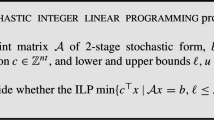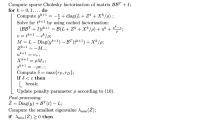Abstract
This paper presents an efficient parallel approximation scheme for a new class of min-max problems. The algorithm is derived from the matrix multiplicative weights update method and can be used to find near-optimal strategies for competitive two-party classical or quantum interactions in which a referee exchanges any number of messages with one party followed by any number of additional messages with the other. It considerably extends the class of interactions which admit parallel solutions, demonstrating for the first time the existence of a parallel algorithm for an interaction in which one party reacts adaptively to the other.
As a consequence, we prove that several competing-provers complexity classes collapse to PSPACE, such as QRG(2), SQG and two new classes called DIP and DQIP. A special case of our result is a parallel approximation scheme for a specific class of semidefinite programs whose feasible region consists of lists of semidefinite matrices that satisfy a transcript-like consistency condition. Applied to this special case, our algorithm yields a direct polynomial-space simulation of multi-message quantum interactive proofs resulting in a first-principles proof of QIP =PSPACE.
Similar content being viewed by others
References
Sanjeev Arora, Elad Hazan & Satyen Kale (2005). The multiplicative weights update method: a meta algorithm and applications. Submitted.
Allan Borodin (1977) On relating time and space to size and depth. SIAM Journal on Computing 6(4): 733–744
Fan K. (1953) Minimax Theorems. Proceedings of the National Academy of Sciences 39: 42–47
Uriel Feige & Joe Kilian (1997). Making games short. In Proceedings of the 29th ACM Symposium on Theory of Computing (STOC 1997), 506–516.
Joan Feigenbaum, Daphne Koller & Peter Shor (1995). A Game-Theoretic Classification of Interactive Complexity Classes. In Proceedings of the 10th Conference on Structure in Complexity Theory, 227–237.
Lance Fortnow, Russell Impagliazzo, Valentine Kabanets & Christopher Umans (2008). On the complexity of succinct zero-sum games. Computational Complexity 17(3), 353–376.
Christopher Fuchs & Jeroen van de Graaf (1999). Cryptographic distinguishability measures for quantum mechanical states. IEEE Transactions on Information Theory 45(4), 1216–1227. ArXiv:quant-ph/9712042v2.
Joachim von zur Gathen (1993). Parallel linear algebra. In Synthesis of Parallel Algorithms, John H. Reif, editor, chapter 13. Morgan Kaufmann Publishers, Inc.
Shafi Goldwasser & Michael Sipser (1989). Private coins versus public coins in interactive proof systems. In Randomness and Computation, Silvio Micali, editor, volume 5 of Advances in Computing Research, 73–90. JAI Press.
Gus Gutoski & John Watrous (2005). Quantum interactive proofs with competing provers. In Proceedings of the 22nd Symposium on Theoretical Aspects of Computer Science (STACS’05), volume 3404 of Lecture Notes in Computer Science, 605–616. Springer. ArXiv:cs/0412102v1 [cs.CC].
Gus Gutoski & John Watrous (2007). Toward a general theory of quantum games. In Proceedings of the 39th ACM Symposium on Theory of Computing (STOC 2007), 565–574. ArXiv:quant-ph/0611234v2.
Gus Gutoski & Xiaodi Wu (2012). Parallel approximation of min-max problems with applications to classical and quantum zero-sum games. In Proceedings of the 27th IEEE Conference on Computational Complexity (CCC 2012), 21–31. ArXiv:1011.2787v2 [quant-ph].
Rahul Jain, Zhengfeng Ji, Sarvagya Upadhyay & John Watrous (2011). QIP = PSPACE. Journal of the ACM 58(6), article 30.
Rahul Jain, Sarvagya Upadhyay & John Watrous (2009). Two-message quantum interactive proofs are in PSPACE. In Proceedings of the 50th IEEE Symposium on Foundations of Computer Science (FOCS 2009), 534–543. ArXiv:0905.1300v1 [quant-ph].
Rahul Jain & John Watrous (2009). Parallel approximation of non-interactive zero-sum quantum games. In Proceedings of the 24th IEEE Conference on Computational Complexity (CCC 2009), 243–253. ArXiv:0808.2775v1 [quant-ph].
Rahul Jain & Penghui Yao (2011). A parallel approximation algorithm for positive semidefinite programming. In Proceedings of the 52nd IEEE Symposium on Foundations of Computer Science (FOCS 2011), 463–471. ArXiv:1104.2502v1 [cs.CC].
Rahul Jain & Penghui Yao (2012). A parallel approximation algorithm for mixed packing and covering semidefinite programs. ArXiv:1201.6090v1 [cs.DS].
Satyen Kale (2007). Efficient algorithms using the multiplicative weights update method. Ph.D. thesis, Princeton University.
Alexei Kitaev (2002). Quantum coin-flipping. Presentation at the 6th Workshop on Quantum Information Processing (QIP 2003).
Alexei Kitaev & John Watrous (2000). Parallelization, amplification, and exponential time simulation of quantum interactive proof system. In Proceedings of the 32nd ACM Symposium on Theory of Computing, 608–617.
Daphne Koller, Nimrod Megiddo (1992) The complexity of two-person zero-sum games in extensive form. Games and Economic Behavior 4: 528–552
Daphne Koller, Nimrod Megiddo & Bernhard von Stengel (1994). Fast algorithms for finding randomized strategies in game trees. In Proceedings of the 26th ACM Symposium on Theory of Computing (STOC 1994), 750–759.
Michael Luby & Noam Nisan (1993). A Parallel Approximation Algorithm for Positive Linear Programming. In Proceedings of the 25th ACM Symposium on Theory of Computing (STOC 1993), 448–457.
Carsten Lund, Lance Fortnow, Howard Karloff & Noam Nisan (1992). Algebraic methods for interactive proof systems. Journal of the ACM 39(4), 859–868.
Chris Marriott & John Watrous (2005). Quantum Arthur-Merlin games. Computational Complexity 14(2), 122–152. ArXiv:cs/0506068v1 [cs.CC].
Nimrod Megiddo (1992) A note on approximate linear programming. Information Processing Letters 42(1): 53
John von Neumann (1928). Zur Theorie der Gesellschaftspiele. Mathematische Annalen 100(1), 295–320. In German.
Michael Nielsen & Issac Chuang (2000). Quantum Computation and Quantum Information. Cambridge University Press.
Christos Papadimitriou (1994). Computational Complexity. Addison-Wesley.
Richard Peng & Kanat Tangwongsan (2012). Faster and Simpler Width-Independent Parallel Algorithms for Positive Semidefinite Programming. ArXiv:1201.5135v1 [cs.DS].
Bill Rosgen & John Watrous (2005). On the hardness of distinguishing mixed-state quantum computations. In Proceedings of the 20th Conference on Computational Complexity, 344–354. ArXiv:cs/0407056v1 [cs.CC].
Maria Serna (1991). Approximating Linear Programming is Log-Space Complete for P. Information Processing Letters 37(4), 233–236.
Adi Shamir (1992). IP = PSPACE. Journal of the ACM 39(4), 869–877.
Luca Trevisan & Fatos Xhafa (1998). The Parallel Complexity of Positive Linear Programming. Parallel Processing Letters 8(4), 527–533.
Manfred Warmuth & Dima Kuzmin (2006). Online variance minimization. In Proceedings of the 19th Conference on Learning Theory, volume 4505 of Lecture Notes in Computer Science, 514–528.
John Watrous (2011). Lecture Notes: Theory of Quantum Information. Available on the author’s web page.
Xiaodi Wu (2010). Equilibrium Value Method for the Proof of QIP=PSPACE. ArXiv:1004.0264v2 [quant-ph].
Neal Young (2001). Sequential and parallel algorithms for mixed packing and covering. In Proceedings of the 42nd IEEE Symposium on Foundations of Computer Science (FOCS 2001), 538–546.
Author information
Authors and Affiliations
Corresponding author
Rights and permissions
About this article
Cite this article
Gutoski, G., Wu, X. Parallel Approximation of Min-Max Problems. comput. complex. 22, 385–428 (2013). https://doi.org/10.1007/s00037-013-0065-9
Received:
Published:
Issue Date:
DOI: https://doi.org/10.1007/s00037-013-0065-9
Keywords
- Parallel approximation algorithm
- semidefinite programming
- zero-sum games
- quantum interactive proofs with competing provers




